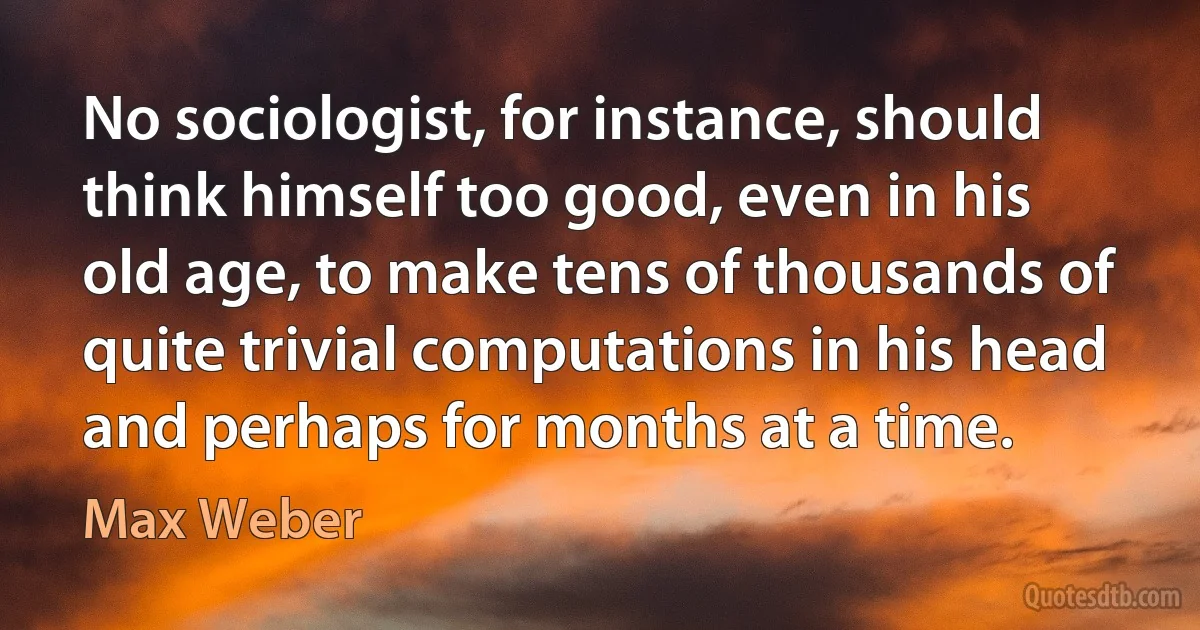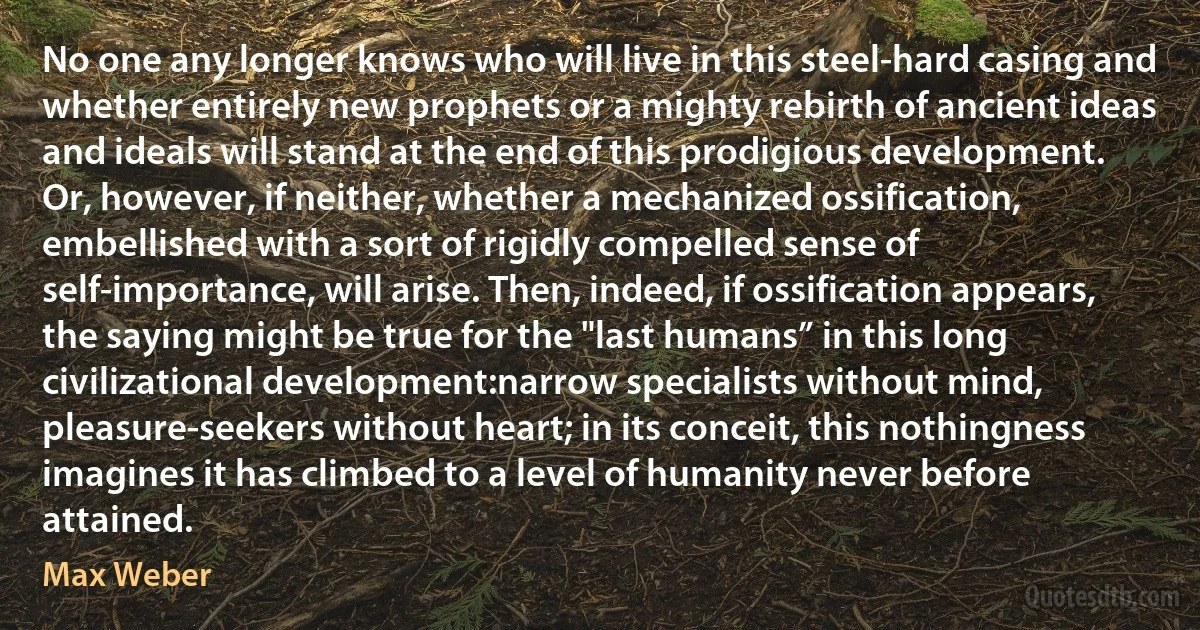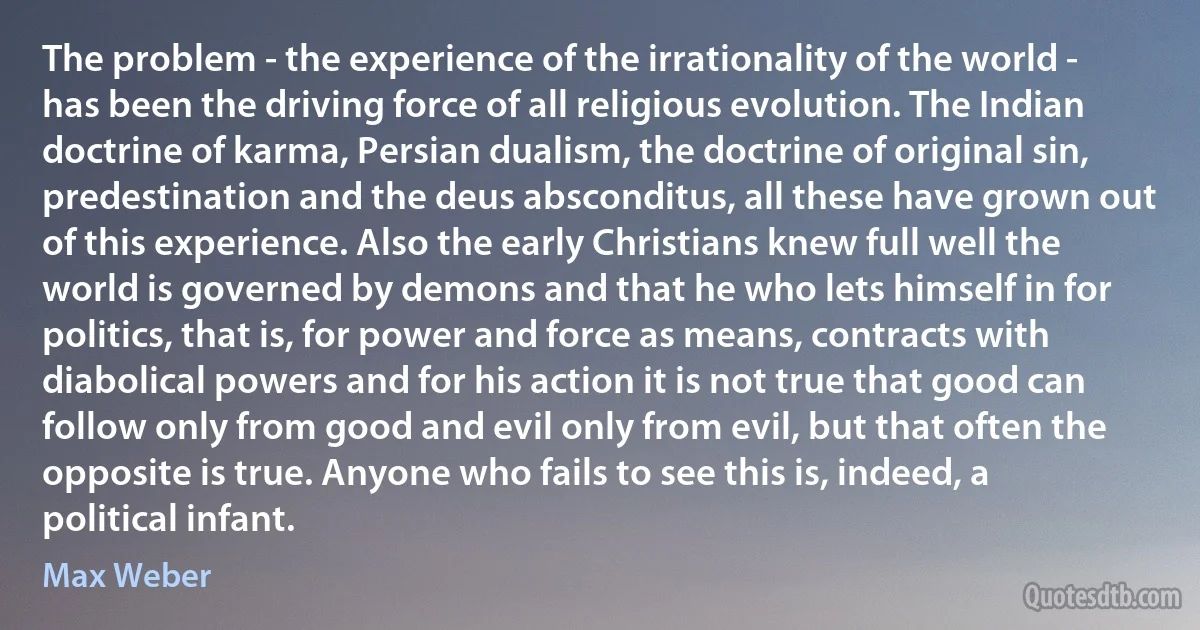Max Weber quotes
The fate of our times is characterized by rationalization and intellectualization and, above all, by the disenchantment of the world. Precisely the ultimate and most sublime values have retreated from public life either into the transcendental realm of mystic life or into the brotherliness of direct and personal human relations. It is not accidental that our greatest art is intimate and not monumental.

Max Weber
The capacity for the accomplishment of religious virtuosos - the "intellectual sacrifice”- is the decisive characteristic of the positively religious man. That this is so is shown by the fact that in spite of (or rather in consequence) of theology (which unveils it) the tension between the value-spheres of "science” and the sphere of "the holy” is unbridgeable.

Max Weber
Persecutions of these heterodoxies ... do not account for the unusually quick victory of Hinduism. Favorable political circumstances contributed to the victory. Decisive, however, was the fact that Hinduism could provide an incomparable religious support for the legitimation interest of the ruling strata.

Max Weber
Ordinarily, the propagation of Hinduism occurs in approximately the following way. ... Native deities are rebaptized with the names of Hindu gods and goddesses. ... Some Brahman is requested to provide and take charge of ritual concerns and thereby also to convince himself and provide testimony to the fact that they-the rulers of the tribe-were of ancient, only temporarily forgotten, knightly (Kshatriya) blood.

Max Weber
Both as ruling and ruled strata and both as a majority and minority, Protestants... have demonstrated a specific tendency toward economic rationalism. This tendency has not been observed in the same way in the present or the past among Catholics, regardless of whether they were the dominant or dominated stratum or constituted a majority or minority. Therefore the cause of the different behavior must be mainly sought in the enduring inner quality of these religions and not only in their respective historical-political external situations.

Max Weber
A true prophecy creates and systematically orients conduct toward one internal measure of value. In the face of this the "world" is viewed as material to be fashioned ethically according to the norm. Confucianism in contrast meant adjustment to the outside, to the conditions of the "world." A well-adjusted man, rationalizing his conduct only to the degree requisite for adjustment, does not constitute a systematic unity but rather a complex of useful and particular traits.

Max Weber
Finally, and of central importance, the special life of the saint-fully separate from the "natural" life of wants and desires-could no longer play itself out in monastic communities set apart from the world. Rather, the devoutly religious must now live saintly lives in the world and amid its mundane affairs. This rationalization of the conduct of life-now in the world yet still oriented to the supernatural-was the effect of ascetic Protestantism's concept of the calling.

Max Weber
After Nietzsche's devastating criticism of those "last men” who "invented happiness,” there is probably no need for me to remind you of the naïve optimism with which we once celebrated science, or the technology for the mastery of life based on it, as the path to happiness. Who believes this, apart from a few overgrown children occupying university chairs or editorial offices?

Max Weber
The Confucian aspirant to office, stemming from the old tradition, could hardly help viewing a specialized, professional training of European stamp as anything but a conditioning in the dirtiest Philistinism. ... The fundamental assertion, ‘a cultured man is not a tool' meant that he was an end in himself and not just a means for a specified useful purpose.

Max Weber
It is above all the impersonal and economically rationalized (but for this very reason ethically irrational) character of purely commercial relationships that evokes the suspicion, never clearly expressed but all the more strongly felt, of ethical religions. For every purely personal relationship of man to man, of whatever sort and even including complete enslavement, may be subjected to ethical requirements and ethically regulated. This is true because the structures of these relationships depend upon the individual wills of the participants, leaving room in such relations for manifestations of the virtue of charity. But this is not the situation in the realm of economically rationalised relationships, where personal control is exercised in inverse ratio to the degree of rational differentiation of the economic structure.

Max Weber
For sure, even with the best will, the modern person seems generally unable to imagine how large a significance those components of our consciousness rooted in religious beliefs have actually had upon culture, national character, and the organization of life. Nevertheless, it can not be, of course, the intention here to set a one-sided spiritualistic analysis of the causes of culture and history in place of an equally one-sided "materialistic” analysis. Both are equally possible. Historical truth, however, is served equally little if either of these analyses claims to be the conclusion of an investigation rather than its preparatory stage.

Max Weber



